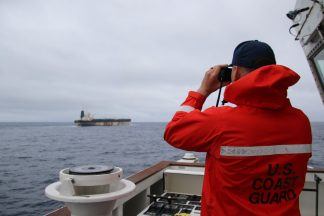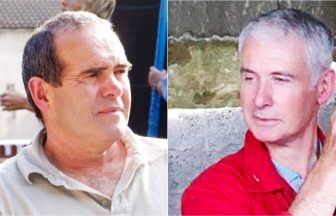The hills and glens of Angus could be used as a giant sponge to soak up extreme rainfall and save communities downstream, like Brechin, from devastating flooding.
Estate owner Dee Ward is considering ‘soft’ flood mitigation measures on his land in Glen Clova following the extensive damage caused by Storm Babet.
More than 400 properties were flooded in Brechin when the River South Esk, which flows down from Glen Clova, overwhelmed the town’s £16m flood defence scheme.
Many other communities in Angus also suffered as more than two months of rain fell in just three days.
On Dee’s 8,000-acre Rottal Estate, the force of the water changed the course of a burn, shifting thousands of tonnes of stone and gravel and blocking the access road.
He’s now considering how upland areas in Angus could be utilised as a form of flood defence to reduce the flow from tributaries of the River South Esk.
“The things we’re looking at, and are starting to do, include peatland restoration as it holds water in the soil for longer, like a massive sponge,” he explained.
“Tree planting and the natural regeneration of trees also helps. Their roots go down into the soil and that allows the water to percolate down.
“We can also block small burns and ditches, allowing water to spill out into the heather.

“If we can hold the water up here for say 12 hours that takes the problem away from Brechin.”
Angus Council is carrying out a modelling exercise to calculate the protection provided by the current flood protection scheme in Brechin, which was completed in 2016 and engineered to cope with a one in 200 year event.
The authority says it will then look at options to increase resilience to flooding in the future.
It’s also in the process of arranging works to replace an older section of Brechin’s flood wall, which collapsed during the storm and has been temporarily filled with bags of sands and gravel provided by a local contractor.
Kelly Ann Dempsey. who leads Angus Council’s environment and climate change team is keen to explore options across the South Esk catchment area.
“Looking to the peaks of the uplands and working your way down to the riverbed, interventions like peatland restoration, river restoration, wetland creation and woodland regeneration can all make a really large contribution in holding water in the catchment,” she said.
“We’re a rural local authority and as we learn more about climate change, mitigation and adaptation, I think we have a real strength in being able to look at nature-based solutions.
“We’re at a stage now where we’re maybe looking at a whole Angus glens approach.”
Dee added: “Soft work up in the uplands is going to be cheaper and more effective than hard works, like concrete works down in places like Brechin.
“There’s a massive area up here, it’s not just Glen Clova it’s Glen Prosen as well and if we can work together with other landowners and get this right I think we can solve the problem.
“If it stops houses flooding and people’s lives being ruined then it’s got to be worth it.”
Follow STV News on WhatsApp
Scan the QR code on your mobile device for all the latest news from around the country



























